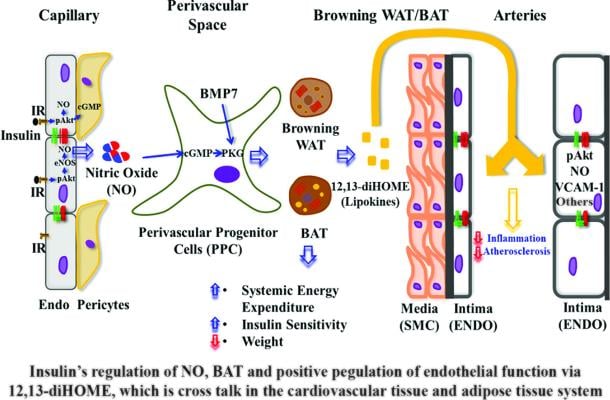
August 8, 2022 — A major risk factor for diabetes, insulin resistance occurs when the cells of the body do not respond to insulin and cannot make use of the glucose (sugar) in the blood stream. The condition is known to increase the risk of cardiovascular disease and atherosclerosis, a buildup of fats inside the blood vessels that can constrict blood flow to the body’s tissues. The exact mechanism by which insulin and the cells lining vascular walls act upon each other has been unknown.
In a paper published in Circulation Research, scientists at Joslin Diabetes Center describe a series of studies designed to determine the relationship among insulin, fats and the vascular system. The team, led by George King, MD, chief scientific officer and director of research at Joslin, identified a new pathway in which the cells lining the blood vessels – called endothelial cells – drive the body’s metabolism. In a reversal of scientific dogma, the findings suggest that vascular dysfunction may itself be the cause of undesirable metabolic changes that can lead to diabetes, not an effect as previously thought.
“In people with diabetes and insulin resistance, the idea has always been that white fat and inflammation causes dysfunction in the blood vessels, leading to the prevalence of heart disease, eye disease and kidney disease in this patient population,” said King, the Thomas J. Beatson, Jr. Professor of Medicine in the Field of Diabetes at Harvard Medical School. “But we found that blood vessels can have a major controlling effect here, and that was not known before.”
In addition to being linked to blood vessel abnormalities, diabetes is also associated with an undesirable decrease in the body’s store of brown fat, also called brown adipose tissue. Unlike white fat which primarily stores energy, brown fat burns energy, maintains body temperature and regulates body weight and metabolism. In a series of experiments with a mouse model of diabetes, King and colleagues observed that mice engineered with enhanced sensitivity to insulin only in the blood vessels weighed less than control animals, even when fed a high-fat diet. It turned out, the extra insulin-sensitive mice had more brown fat than control animals; they also showed less damage to the blood vessels.
The team’s further investigation revealed that insulin signals endothelial cells in the blood vessels to produce nitrous oxide, which in turn triggers the production of brown fat cells. In the context of insulin resistance, endothelial cells produced less nitrous oxide – a decrease known to raise cardiovascular risk – leading to a drop in brown fat production. Because brown fat plays such an integral role in regulating the body’s weight and metabolism, smaller brown fat stores could be a risk factor for, not a symptom of, diabetes.
“What we found here is that the endothelial cells lining the blood vessels can have a major controlling effect on how much brown fat you develop,” said King. “Nitrous oxide comes from endothelial cells to regulate how much brown fat you make, and that finding is very exciting because in the past we thought diabetes causes cardiovascular problems, but that relationship appears to be reversed in this scenario.”
The study’s findings set the stage to use brown fat and the suite of hormones and inflammatory proteins it controls as biomarkers, or signs physicians can test for, for atherosclerosis or cardiovascular disease. Down the road, with future animal and clinical studies, this new information could open the door to an entirely new method of weight control by increasing brown fat tissues through improving endothelial nitrous oxide production.
“Everything is connected,” said King. “We think blood vessels and endothelial cells play an important role not just in regulating brown fat, but also in regulating whole body’s metabolism. Thus, these endothelial cells are a key factor in regulating weight and developing diabetes and, as other labs have shown, blood vessels appear to be a major regulator of brain function as well. Intervening at the level of endothelial cells could have a major impact on many diseases.”
For more information: https://www.joslin.org


 January 05, 2026
January 05, 2026 









